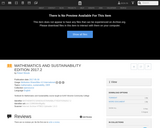
Textbook for Mathematics and Sustainability course taught at SUNY Broome Community College
- Subject:
- Mathematics
- Material Type:
- Textbook
- Author:
- Robert Woods
- Date Added:
- 10/22/2018

Textbook for Mathematics and Sustainability course taught at SUNY Broome Community College
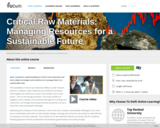
Gain a systemic understanding of critical raw materials and learn about strategies and solutions to manage them in a sustainable way.
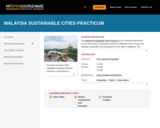
The Malaysia Sustainable Cities Practicum is an intensive field-based course that brings 15 graduate students to Malaysia to learn about and analyze sustainable city development in five cities in Malaysia. The students in the Practicum will help determine the extent to which these efforts have been successful. They will identify specific projects or policy-making efforts that the following year’s cohort of International Visiting Scholars can examine more closely.
Lead Faculty
Professor Larry Susskind
Teaching Assistants
Jessica Gordon
Yasmin Zaerpoor
Administrative Staff
Takeo Kuwabara
Selmah Goldberg
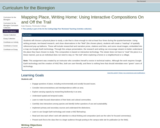
Students will choose a physical place to study, a site that is close enough to visit at least four times during the quarter/semester. Using writing prompts, text-based research, and close observations in the "field" (the chosen place), students will create a "mashup" of spatially referenced pop-up balloons. These will include researched and narrative prose, citations and links, and some visual images, embedded into a map via Google Earth technology. Through this unique presentation, the research and writing can encourage viewers to better understand the place they have chosen to study.
(Note: this resource was added to OER Commons as part of a batch upload of over 2,200 records. If you notice an issue with the quality of the metadata, please let us know by using the 'report' button and we will flag it for consideration.)
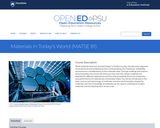
What materials have you touched today? In today's society, virtually every segment of our personal and professional lives is influenced by the limitations, availability, and economic considerations of the materials used. Through readings and science documentaries, this course will show you how and why certain materials are selected for different applications and how the processing, structure, properties, and performance of materials are intrinsically linked. You will be introduced to the basic science and technology of materials, how the world has been shaped by materials, and how knowledge of materials can be used to understand modern materials and the development of new ones.
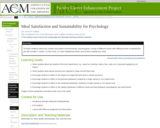
To teach students about the content and impact (environmental, psychological, social) of different meals with differing levels of satisfaction, we will consider 3 meals: 1) Fast Food; 2) Least Satisfactory Meal; and 3) More satisfactory meal.
(Note: this resource was added to OER Commons as part of a batch upload of over 2,200 records. If you notice an issue with the quality of the metadata, please let us know by using the 'report' button and we will flag it for consideration.)
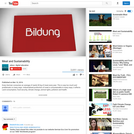
Every German consumes an average of nearly 90 kg of meat every year. This is way too much and problematic in many ways. Industrialized production of meat is unsustainable in many ways, it affects: Land consumption, food security, climate change, animal rights, pollution and health.
But what exactly are the problems of industrial meat production? What are the global implications? And what can be done about?
Realization: edeos- digital education
http://www.edeos.org/en
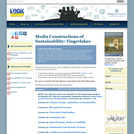
This kit explores how sustainability within the Finger Lakes region of New York has been presented in the media with a particular focus on issues related to food, water and agriculture. Each of the seven lessons integrates media literacy and critical thinking with key knowledge and concepts related to sustainability. This kit is a companion to the nineteen-lesson collection, Media Constructions of Sustainability: Food, Water and Agriculture.
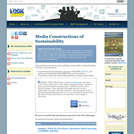
This kit explores how sustainability has been presented in the media with a particular focus on issues related to food, water and agriculture. Each of the 19 lessons integrates media literacy and critical thinking into lessons about different aspect of sustainability. Constant themes throughout the kit include social justice, climate change, energy, economics and unintended consequences.
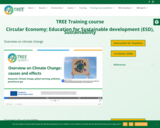
The goal of the project is to increase the employability of VET students in the process of change towards a more sustainable and circular economy and to make them aware of the environmental issue, by providing them with skills and knowledge related to those themes.
The training course platform contains lectures on EC and sustainability, in both slideshow and interactive slides form, and the description of the practical activities and useful tips and suggestions for the project-work. All materials developed follow the methodology of micro and project-based learning. The platform and its contents is available in 5 languages (EN, BG, LT, NL, EE)
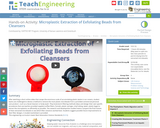
After watching a short online video that recaps the enormous scale of accumulating plastic waste in our oceans, student teams are challenged to devise a method to remove the most plastic microbeads from a provided commercial personal care product—such as a facial cleanser or body wash. They brainstorm filtering methods ideas and design their own specific procedures that use teacher-provided supplies (coffee filters, funnels, plastic syringes, vinyl tubing, water, plastic bags) to extract the microplastics as efficiently as possible. The research and development student teams compare the final masses of their extracted microbeads to see which filter solutions worked best. Students suggest possible future improvements to their filter designs. A student worksheet is provided.
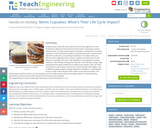
Students learn about life-cycle assessment and how engineers use this technique to determine the environmental impact of everyday products and processes. As they examine what’s involved in making and consuming cupcakes, a snack enjoyed by millions of people every year, students learn about the production, use and disposal phases of an object’s life cycle. With the class organized into six teams, students calculate data for each phase of a cupcake’s life cycle—wet ingredients, dry ingredients, baking materials, oven baking, frosting, liner disposal—and calculate energy usage and greenhouse gases emitted from making one cupcake. They use ratios and fractions, and compare options for some of the life-cycle stages, such as different paper wrapper endings (disposal to landfills or composting) in order to make a life-cycle plan with a lower environmental impact. This activity opens students’ eyes to see the energy use in the cradle-to-grave lives of everyday products. Pre/post-quizzes, worksheets, activity cards, Excel® workbook and visual aids are provided.
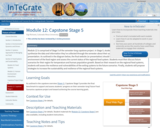
Module 12 is comprised of Stage 5 of the semester-long capstone project. In Stage 5, students compile, organize, summarize and synthesize the data and information they've collected through the semester about their assigned food region into a final website or presentation. As outlined in the diagram below, the final website (or presentation) should summarize the physical and human environment of the food region and assess the current status of the regional food system. Students must then discuss future scenarios for their region for temperature and human population growth. Based on their research on the regional food systems, students will assess the resilience and vulnerabilities of the exiting systems to the future scenarios. Finally, students will propose strategies to increase the sustainability and resilience of the regional food systems.
(Note: this resource was added to OER Commons as part of a batch upload of over 2,200 records. If you notice an issue with the quality of the metadata, please let us know by using the 'report' button and we will flag it for consideration.)
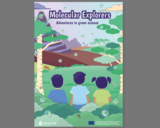
Join our team of young explorers on their mission to save nature from pollution! When this group of friends discovers the impact people have on their environment, they embark on a quest for justice and answers that quickly throws them into a whirlwind of adventures. Their goal: to find powerful molecules capable of solving the pollution problem. Get ready for an exciting journey through unexplored territories and discover the microscopic power hidden all around us. Be part of our quest for a greener world!

This resource is a video abstract of a research paper created by Research Square on behalf of its authors. It provides a synopsis that's easy to understand, and can be used to introduce the topics it covers to students, researchers, and the general public. The video's transcript is also provided in full, with a portion provided below for preview:
"Probiotics are one strategy farmers use to boost animal production. These live microorganisms promote gut health, improve metabolism, and stave off harmful pathogens. While the effects of probiotics on the gut microbiomes of terrestrial animals have been extensively examined. less is known about their effects on the microbiomes of fish. To find out, researchers looked at multiple omics datasets, to explore how rainbow trout responded to feed containing probiotics and “synbiotics," mixtures of pre- and probiotics. A look at conventional measures of feed efficiency showed mixed results versus controls, such as decreases in weight gain (not significant) and protein efficiency (significant), but a significant increase in lipid efficiency. In the gut, pro- and synbiotic additives were associated with a decreased abundance of otherwise plentiful Mycoplasma bacteria..."
The rest of the transcript, along with a link to the research itself, is available on the resource itself.

The Education About Asia (2017) piece orients students to current debates about the specter of water wars. The essay presents cases in South and Southeast Asia to illustrate how international water conflicts are more likely to engender ordinary, everyday forms of violence than the spectacular conflicts envisioned in water wars.
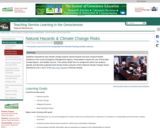
Students characterize how climate change impacts natural hazards and pose research-based solutions to the county Emergency Management Agency. Presentations require the use of local data, created figures, and reliable sources. This activity builds from an assignment which has students identify and describe projected local climate trends using the USGS National Climate Change Viewer followed by Unit 1 and 2 of the Map Your Hazards InTeGrate Module.
(Note: this resource was added to OER Commons as part of a batch upload of over 2,200 records. If you notice an issue with the quality of the metadata, please let us know by using the 'report' button and we will flag it for consideration.)
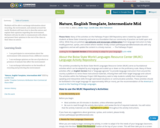
Students will be able to exchange information about recycling, the environment, and animals around the world. Students will learn how to describe nature and explain their opinions regarding the environment. Students will also be able to communicate with others and present their opinions to the rest of the class on their ideas on nature.
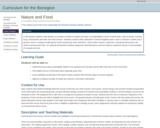
In this activity students read articles or excerpts of books to explore the topic of sustainability in terms of food webs, roles of plants, animals, fungi, and bacteria and their own food choices. Students continue their exploration of these kingdoms with a visit to a farmers' market and a grocery store to compare locally grown foods and grocery store selections.
(Note: this resource was added to OER Commons as part of a batch upload of over 2,200 records. If you notice an issue with the quality of the metadata, please let us know by using the 'report' button and we will flag it for consideration.)

This customized independent study course puts Sloan Fellows MBA students into direct contact with innovators tackling global needs in education, healthcare, and energy/environment. Co-designed projects address low-income markets in the U.S. or globally, focusing on the application of new ideas and technology rooted in MIT innovations or the Boston ecosystem. Every project aims to develop better ways for the right innovations to reach scale, sustainability, and quality, thereby improving lives and uncovering opportunities in underserved markets.